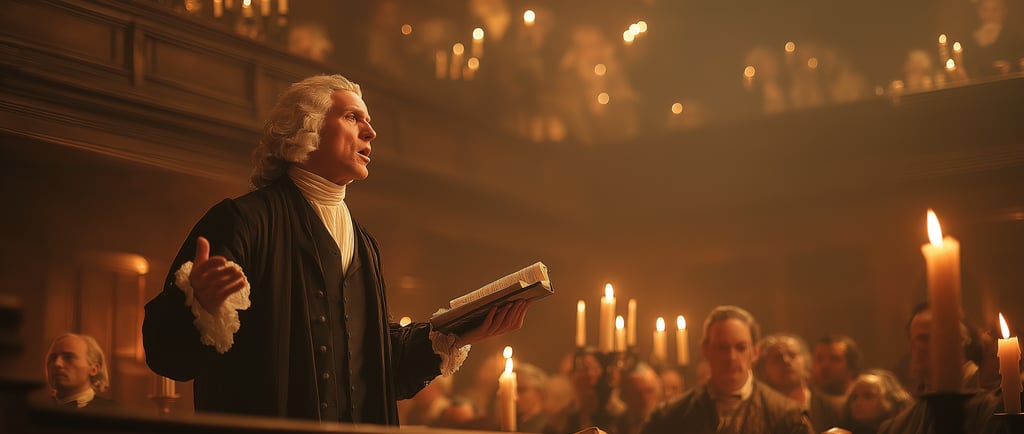Jonathan Edwards and His Longing for Revival
“O Lord, revive Thy work in the midst of the years…” —Habakkuk 3:2 When we think of revival in America’s early history, one name echoes through time: Jonathan Edwards. More than just a preacher, Edwards was a man consumed by a holy hunger. He longed—not for fame, numbers, or emotionalism—but for a genuine outpouring of the Holy Spirit that would awaken the hearts of men to the beauty and majesty of God. His passion burned in a time when the spiritual climate was cold, the church had grown comfortable, and religion had become routine.
3 min read


“O Lord, revive Thy work in the midst of the years…” —Habakkuk 3:2
When we think of revival in America’s early history, one name echoes through time: Jonathan Edwards.
More than just a preacher, Edwards was a man driven by a holy hunger. He longed—not for fame, numbers, or emotionalism—but for a true outpouring of the Holy Spirit that would awaken people's hearts to the beauty and majesty of God. His passion burned during a time when the spiritual climate was cold, the church had become comfortable, and religion had become routine.
And yet, through his tears, his theology, and his relentless intercession, the flames of revival began to rise.
A Mind on Fire
Born in 1703 in colonial Connecticut, Edwards was a prodigy. He entered Yale at age 13 and was steeped in theology and philosophy by the time most boys were still learning how to farm. But knowledge alone didn’t satisfy him. He craved revelation, not just information. And at the heart of that revelation was this: God is infinitely glorious, and our lives only make sense when they’re centered on Him.
He wrote:
“God is the highest good of the reasonable creature. The enjoyment of Him is our proper happiness.”
This wasn’t cold doctrine. It was the fuel of revival—a vision of God that awakens the soul.
The Church in Slumber
By the 1730s, the churches of New England had become spiritually drowsy. Christianity had become a cultural badge more than a burning conviction. Edwards, pastoring in Northampton, saw the lifelessness firsthand. But he also sensed something deeper—a divine tension, as if the heavens were heavy with the potential of a coming downpour.
He began preaching messages that emphasized justification by faith, the reality of sin, the glory of Christ, and the urgent need for salvation. And then—it happened.
In 1734, revival broke out. People were convicted of sin. Young people repented. Households prayed together. The town was “full of the presence of God,” Edwards wrote. The spark had turned into a flame.
“Sinners in the Hands of an Angry God”
In 1741, Jonathan Edwards preached what would become one of the most famous sermons in American history: “Sinners in the Hands of an Angry God.”
He did not yell. He did not shout. He read calmly from a manuscript.
But what shook the people wasn’t his voice—it was the weight of eternal truth. Edwards painted the reality of judgment and the horror of sin, but he also pointed to the mercy of a Savior who holds back the wrath we deserve.
People wept. Others cried out in desperation. Some clung to pews as if they were dangling over the fires of hell. Revival had come—not through manipulation, but through conviction.
A Vision for True Revival
Edwards longed for revival—but not a shallow one. He wasn’t interested in spiritual fireworks without fruit. He wrote The Distinguishing Marks of a Work of the Spirit of God to help people discern between genuine revival and counterfeit hype.
To him, true revival produced transformation—holiness, love for God, humility, and hunger for Scripture. He believed that revival wasn’t something we could manufacture—but it was something we could pray for, preach toward, and long after.
He said:
“The Spirit of God is like a fire to burn up the corruption of the heart.”
What Does This Mean for Us Today?
In a time when many churches are again cold…
In a generation overwhelmed by distractions, compromise, and confusion…
We need the heart of Jonathan Edwards—a heart that cries out:
“O God, rend the heavens and come down!”
Revival isn’t outdated. It’s essential. And while the methods may change, the longing remains the same: a desire for God to make Himself known among His people.
A Prayer for Our Generation
Lord, awaken us like You did in Jonathan Edwards’ day.
Shake us from apathy.
Let the fire of Your holiness burn again in our hearts.
Make us long—not for crowds, but for Christ.
Not for hype, but for holiness.
May we tremble at Your Word, rejoice in Your mercy, and rise to declare Your glory.
Are you longing for revival?
Drop a comment below, share this post with someone hungry for more of God, and let’s contend together for another Great Awakening.